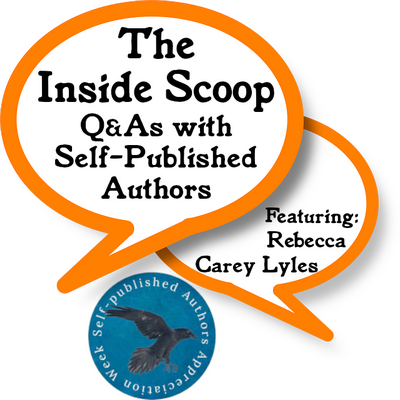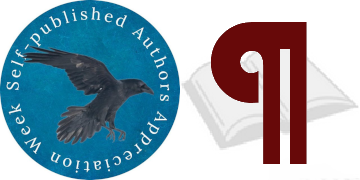
In our brief acquaintance, Rebecca Carey Lyles has participated in a Literary Locals Q&A with me, recommended others for that project, had me on her podcast, and has now subjected herself to this series (and we have at least one more Q&A to come once I catch up on some reading). I cannot thank her enough for all this. Lyles as some great experience—and therefore has plenty of advice to provide.
Before we get into things, why don’t you give the reader a brief introduction to you and your work.
Thanks so much for asking, H.C. I’m a wife, mom and grandma as well as an author and an editor. Although I’ve written for a variety of publications, fiction became my passion when I moved to Idaho and joined a wonderful Treasure Valley writing group. Since then, I’ve written two fiction series plus the first book in a third series.
My tagline for my novels is Contemporary Romance Set in the West and Salted with Suspense. But some have suggested the books are suspense salted with romance due to the subject matter and action/adventure aspect. Although I tackle difficult subjects like human trafficking, coercive cults, and contemporary polygamy, I always promise happy endings—because I like happy endings.
Here are some links for you to peruse:
Website: http://www.beckylyles.com
Amazon Author Page: https://Lyles.gy/t54xp
Facebook Author Page: Rebecca Carey Lyles
Twitter: @BeckyLyles
What are some of the biggest misconceptions you find that readers have about self-published books?
From what I’ve observed, readers don’t look to see who published a book. They choose a book based on the cover and the blurb, a recommendation from a friend, or good reviews. They might even read the first two or three pages online or at a bookstore to see if the story interests them. Therefore, I assume most readers don’t have misconceptions about self-published books, but I could be wrong…
The shoe is on the other foot, eh? I’ve got misconceptions about readers? I buy that
What kind of costs are associated with self-publishing a book? Do you hire one or more editors, or one editor for a couple of passes? Cover artist? Anyone to help with layout, design, etc.? Beta readers? Or do you take it all on yourself? Are you actually making any money at this, or are you still focused on breaking-even while building an audience?
I’m an editor, but I’ve also paid for book edits. I’ve designed book covers for a couple people who requested that I do so, but I always hire graphic artists to design my covers. In the early days, I hired someone to do interior design and then realized I could do it myself. And I always enlist the help of beta readers and proofreaders. Their input is crucial to the final product’s quality. About sales, I’ve found the only way to sell more than a handful of books is to advertise, which is not how most authors like to spend their time and money. But it’s a necessary evil of the writing game these days.
I think we’ve talked about this already, but this is a new context—what kinds of advertising has proved the most effective for you? Least effective? From talking to other writers, do their experiences match up, or does it vary a bit from person-to-person/genre-to-genre?
Facebook ads do the best for me, but they require a huge learning curve and can get pricey. I’ve taken courses re. how to advertise books and continue to follow several experts.
These links may be helpful.
https://davidgaughran.com/ [crazy hair, fun accent, and a great sense of humor!] Here’s his list of book promotion sites: https://davidgaughran.com/best-promo-sites-books/
https://learn.selfpublishingformula.com/p/adsforauthors [Mark Dawson also has a fun accent and an excellent podcast: https://selfpublishingformula.com/spf-podcast/]
https://kindlepreneur.com/book-marketing/ [Dave Chesson has plenty to offer, including a zany sense of humor!]
Do you do your own cover design, or have you found people to help with that? It seems almost as difficult as writing the novel itself—talk about the process a bit.
A quality book cover is crucial because the old adage is true, we do judge books by their covers. For that reason, I hire professional graphic artists to create my covers. I’ve worked with local artists and online artists. I’m always thrilled when a designer can take the vague ideas I suggest, hone in on one, make it “come alive,” and produce the perfect cover for a book, whether fiction or nonfiction. The designers I’ve used have all been well-qualified and reasonably priced as well as patient and willing to make the (many) changes I request.
How do you go about finding these artists—online or local? What’s the process of vetting them and then getting the cover to start requesting changes on? (cover design is one of those topics I can’t get enough of—I don’t know why)
I found my first cover artist at the library. Actually, I heard an author speak there whose cover had been designed by a local graphic artist. She put me in touch with him, and he designed several covers for me. Another local recommendation came through a writer friend. My latest cover was designed by 100 Covers [https://100covers.com/], and I was quite pleased. After I explained my vision, each artist threw out an initial concept (or two), and we went from there. As I said, everyone has been patient with my multiple changes. Several other reputable sites offer expert cover creation or programs to create covers.
Are there tools, mentors, websites you’ve found to help you through this process? Or did you stumble through blindly on your own?
Through Idahope Christian Writers (ICW), a local faith-based writers’ group, I’ve met lots of Treasure Valley authors; plus, I attend their workshops and conferences. (ICW’s new website should become active soon: https://idahopechristianwriters.org/) Not only is the wisdom, knowledge, encouragement and camaraderie of likeminded friends valuable, smaller critique groups have formed from the main group. My crit partners are super helpful. They provide a fresh perspective and ideas I hadn’t thought of, suggestions to improve my writing, insights re: story direction, and so much more. Even better, we’ve become good friends and prayer partners.
Three podcasts I find helpful –
https://www.thestoryblender.com/
https://selfpublishingformula.com/spf-podcast/
https://www.thecreativepenn.com/podcasts/
What made you decide that self-publishing was the direction you wanted to go? How often do you question that choice? How do you get through the self-doubt?
I worked with a partner publisher for my first nonfiction book and a second partner publisher for my first fiction book. Both experiences were good but taught me I could do everything they did except create the cover. For a brief time, I had an agent who sent out a mass query to ten or so traditional publishers. After informing me none of them showed interest, I didn’t hear from him again. When I finally contacted him, I discovered he’d forgotten about me. Rather than search out another agent and extend the process even longer, I decided to go the indie route and haven’t regretted it. I’d love for someone else to do the marketing for me, but I hear traditional publishers expect their writers to market their books just like we indie authors must do.
Self-publishing tends to have less external deadlines keeping one accountable. How do you maintain your work process or work ethic?
For me, I think it’s an ingrained from childhood finish what you start ethic plus the nagging need to get a story out of my head and into the computer/onto paper.
What was your process for learning how to take care of all the facets that go into self-publishing? (editing, book cover and design, ISBN, finding places to sell/distribute, etc.)?
Workshops, seminars and conferences for writers, how-to-write books and magazines, online research, webinars, podcasts—and lots and lots of trial and error.
Would you be willing to share a trial or two that resulted in errors you learned from?
Wow, you’re stretching my memory. Way back, when online book sales weren’t nearly as challenging as they are today, my books sold fairly easily with minimal advertising. But then my daughter got married (silly girl!) and I focused on the wedding and reception and a houseful of company and lost momentum just when authors began to flood the internet with books. And thus, to diminish the opportunities for a book to be noticed.
I’ve done something similar lately. After months of pushing hard with Facebook ads and then Amazon ads, I became weary of the time and expenditure marketing books demands. And stopped all ads. Funny thing, sales have dropped in tandem with lack of marketing. Must get back to it! I’m pretty sure any business person would tell me/us that marketing must be consistent and ongoing.
Also back in the day, every ebook sales site demanded a different format—Kobo, Amazon, Barnes & Noble, Apple, etc. The trial and error was figuring out each of their complicated formats. Today, thank God, we have Draft2Digital, a wonderful aggregator that provides distribution services for authors whose books aren’t exclusive to Amazon. https://www.draft2digital.com/
Thanks for your time and participation! Hope you enjoyed it! And do know that there are many of us out here who appreciate and applaud what you do (and our number is growing)!
Lyles has quite the variety of books to look into, be sure to look into them!

Clker-Free-Vector-Images from Pixabay
The 2023 Self-Published Authors Appreciation Week Logo was made by Witty and Sarcastic Book Club




Read Irresponsibly, but please Comment Responsibly